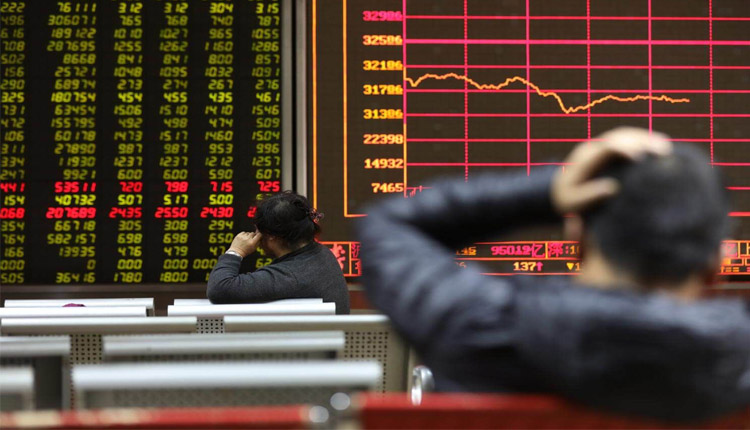Japanese stocks ended their trading year in negative territory on Friday.
The Nikkei 225 and Topix index both struggled for gains on the day: The former slipped 0.31 percent to close at 20,014.77 while the latter shed 0.5 percent to finish its trading week at 1,494.09. The declines came on the back of two straight days of gains for both indexes.
Those losses saw the Nikkei 225 post its first annual loss since 2011. The Topix also booked its largest annual loss since 2011, according to Reuters. The Japanese markets are closed next Monday, making Friday their final trading day of 2018.
The moves in Japan came after the country’s central bank released its summary of opinions from its December monetary policy meeting, where it noted the “heightening” of downside risks to economic activity.
“Regarding the outlook for the global economy, risks have been tilted to the downside on the whole amid heightening uncertainties and a prevailing view that such situation will be protracted,” said the note from the Bank of Japan.
Japan’s industrial output also declined in November, registering a 1.1 percent fall as compared with the previous month. The country’s jobless rate also increased to 2.5 percent in November, as compared to 2.4 percent in October, according to data from the Ministry of Internal Affairs and Communications.
Other major Asian indexes gain
Elsewhere in Asia, however, stocks mostly saw gains on Friday.
The mainland Chinese markets, closely watched in relation to the Sino-U.S. trade war, were higher on the day. The Shanghai composite rose approximately 0.44 percent to close at about 2,493.90.
The Shenzhen composite gained 0.288 percent to finish its trading week at around 1,267.87 while the Shenzhen component added 0.339 percent to close at about 7,239.79.
Meanwhile, Hong Kong’s Hang Seng index fractionally lower during its final hour of trade.
The ASX 200 in Australia gained about 1.02 percent to close at 5,654.3, with most of its sectors higher. The heavily weighted financial subindex rose 2.34 percent as shares of Australia’s so-called Big Four banks saw gains.
Australia and New Zealand Banking Group climbed up by 2.70 percent, Commonwealth Bank of Australia rose 2.25 percent, Westpac gained 2.98 percent and National Australia Bank advanced 2.66 percent.
South Korea’s Kospi gained 0.62 percent to close at 2,041.04.
Wild session on Wall Street
In overnight market action stateside, stocks rebounded from negative territory to ultimately add to their strong gains from Wednesday.
The Dow rose 260.37 points, or 1.1 percent, to close at 23,138.82. The S&P 500 advanced 0.86 percent to end the day at 2,488.83 while the Nasdaq Composite gained 0.4 percent to close at 6,579.49.
At its lows of the day, the Dow had fallen 611 points. The S&P 500 and Nasdaq fell as much as 2.8 percent and 3.3 percent, respectively.
Futures also pointed to a slightly higher open for stocks stateside, during the afternoon of Asian trading hours on Friday.
Fresh concerns over Huawei and ZTE
Markets stateside were rocked earlier during their trading session on Thursday by renewed tensions between China and the United States. The ongoing fight between the two economic powerhouses has rattled global stock markets for much of 2018.
Reuters reported, citing three sources familiar with the situation, that U.S. President Donald Trump is considering an executive order to ban American companies from using telecommunications equipment made by China’s Huawei and ZTE.
Hong Kong-listed shares of ZTE gained around 0.8 percent on Friday, as of their final hour of trade, after seeing declines the previous day. Its Shenzhen-listed counterpart, however, fell 1.56 percent on the day.
The report comes amid efforts by officials from China and the U.S. to strike a permanent trade deal. Earlier in December, the two countries agreed to a 90-day grace period on implementing additional tariffs in order to come up with an agreement.
Following that development, the British newspaper The Times also reported that Britain’s defense minister said he has “grave, very deep concerns about Huawei providing the 5G network in Britain. ”
A spokesperson for the Ministry of Defence confirmed Williamson’s comments to CNBC over the phone.
The next-generation 5G wireless standard is expected to be a significant leap over the current generation, enabling technologies such as the internet of things and autonomous vehicles through higher data transfer speeds and reduced communication time between devices. The U.S., China and even Finland are jostling for supremacy over the nascent technology.
Currencies
The U.S. dollar index, which tracks the greenback against a basket of its peers, was at 96.332 after seeing an earlier high of 96.517.
The Japanese yen, widely viewed as a safe-haven currency, traded at 110.48 against the greenback after touching lows around 111.3 yesterday. The Australian dollar was at $0.7048 after touching highs above $0.707 in the previous session.
Source: CNBC


